Wakako Ueno raised three daughters to Olympic or world championship glory and now the matriarch of Japan’s most decorated judo dynasty is passing on her passion to the next generation.
The 64-year-old puts about 10 children as young as seven through their paces in her tatami-mat dojo in the small town of Toma on the island of Hokkaido.
Each session starts with the children sitting on their knees to recite the teachings of judo founder Jigoro Kano, who stares down at them from a small black-and-white portrait on the wall: “Judo is about harnessing your mental and physical strength in the most efficient way possible.”
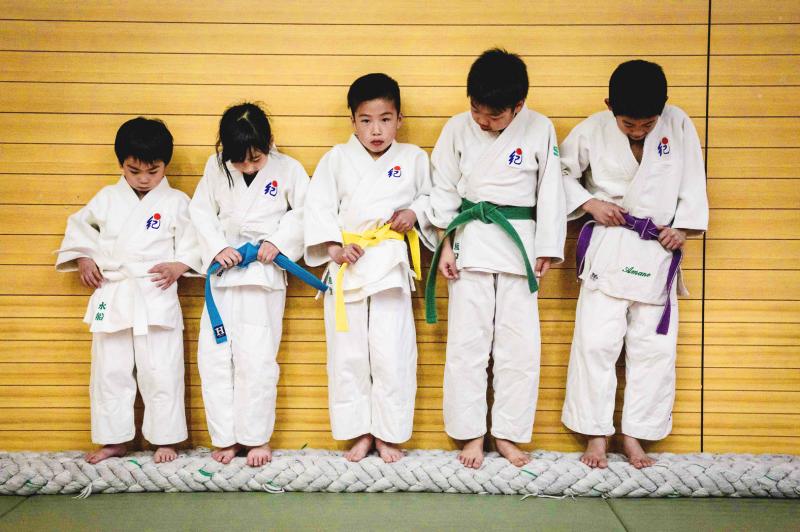
Photo: AFP
However, the coach said that she wants to transmit the enjoyment of judo to the next generation.
“Judo is fun. It’s exciting. I want the children to experience that excitement,” she said.
Ueno fell in love with the sport 40 years ago, learning it from her late husband. She still remembers feeling “exhilarated when she was able to throw her opponent cleanly.”
At that time, there were few female judoka around and she grew frustrated.
“There were no women at all. So I practiced with my husband, but I had no chance of winning,” Ueno said. “I was upset.”
So, along with her husband, Wakako Ueno threw herself into preparing their eldest daughter, Masae Ueno, for international judo competition. She would go on to win gold at the 2004 and 2008 Olympic Games.
“I had no choice. Judo was the same as eating. It was part of our lives,” said Masae Ueno, now 41 and working as a part-time judo coach in Tokyo.
Her father took the lead in her training and he took no prisoners.
She once had to stand in the middle of the tatami floor and fight 10 boys one by one.
Female judoka were rare at that time, so her training partners were almost always stronger boys.
“I had to keep pushing forward even if I was thrown by my opponents,” Masae Ueno said, adding that her father’s methods stripped some enjoyment out of the sport.
“He was strict, so I have no memory of having fun doing judo. I did it because I had to,” she said, able to laugh at the memory decades later.
Her sister, Yoshie Ueno, who won bronze at the 2012 London Games, recalls similar brutality from her father, who would swing a bamboo sword while yelling at underperforming students.
“It was scary. Even if we wanted to run away, we couldn’t,” said the 36-year-old, now a national team coach.
Nevertheless, she credits her upbringing with the family’s astonishing success on the mat.
“Judo education was ingrained in us at home. That’s why we are who we are now,” she said. “There aren’t many families whose members all do judo — maybe a father, but rarely a mother as well.”
The Uenos are keeping it in the family as youngest daughter, Tomoe, a 30-year-old former junior world champion, helps her run the dojo.
Wakako Ueno is aiming to spread the word about judo, which is declining in popularity — from a peak of 250,000 practitioners in 1993 to about 150,000 in 2018, the All Japan Judo Federation said.
“Baseball is on TV every day, soccer as well. Children are attracted to the sports that are shown on television,” she said.
While judo spikes in popularity during the Olympics, once every four years is not enough, she said.
Looking back, Wakako Ueno said that she and her husband might have driven their daughters too hard in their pursuit of victory.
She said that she was so shocked when Masae Ueno crashed out of the 2000 Sydney Games after losing three matches — she could not even speak to her.
“I regret that. Athletes are already under so much pressure. I decided after that to remember it is the efforts they are making that are the most important. It’s not all about the medals,” she said.
Now she wants to continue her husband’s legacy in coaching and toughen up the younger generation — but without the strict training methods.
“In judo, 20 percent is fun and maybe the remaining 80 percent is tough, but by overcoming this, you’ll be strong physically and mentally,” Wakako Ueno said.
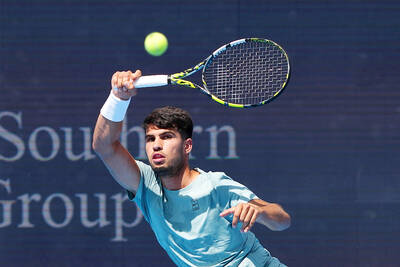
Carlos Alcaraz on Sunday fought through a second-set slump to post a roller-coaster 6-1, 2-6, 6-3 victory over Damir Dzumhur in his opening match at the Cincinnati Open. The Spaniard, playing his first tournament since losing to Jannik Sinner in the Wimbledon final, raced through the first set, but completely lost his way in the second, dropping his serve twice against the 33-year-old Bosnian. Alcaraz regained his intensity and cut down his errors in the third set as a seventh ace took him to a match point that was converted when Dzumhur fired wide. “It was just a roller coaster,” said the second
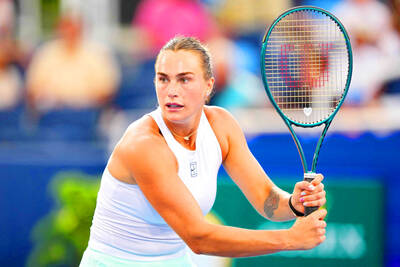
Defending champions Jannik Sinner and Aryna Sabalenka on Wednesday led the way into the Cincinnati Open quarter-finals, with Carlos Alcaraz hot on their heels after a straight-sets victory of his own. Sinner shrugged off a mid-match weather delay lasting nearly three hours as he advanced 6-4, 7-6 (7/4) over Adrian Mannarino. Alcaraz, the second seed who has reached the final in his past six tournaments, hammered Italian lucky loser Luca Nardi 6-1, 6-4. After sweeping the opening set in 28 minutes, Alcaraz hit a speed bump, dropping his serve to trail 2-4. He promptly regained the break, then fought through a marathon ninth game
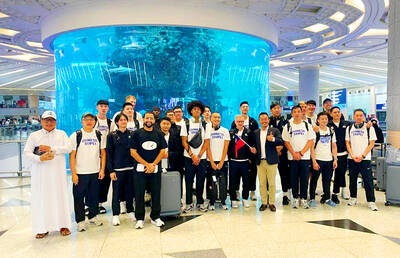
Taiwan’s men’s basketball team on Monday clinched a spot in the FIBA Asia Cup quarter-finals with a 78-64 win over Jordan in Saudi Arabia, securing their best finish in the tournament since placing fourth in 2013. The win was sweet revenge for Taiwan, who were denied a quarter-final spot by Jordan at the same stage of the previous Asia Cup in 2022 after blowing a nine-point lead in the final minute and losing 97-96 on a half-court buzzer-beater. “History is part of the journey,” Taiwan head coach Gianluca Tucci said when asked about the 2022 collapse of the team, who he did
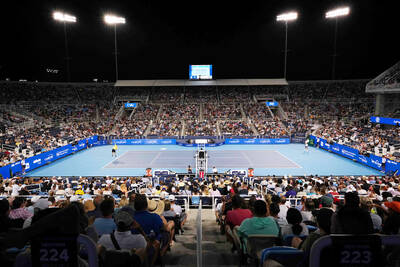
NEXT ROUND: World No. 1s Jannik Sinner and Aryna Sabalenka opened their title defenses with straight-sets wins, while Iga Swiatek and Taylor Fritz also advanced Jannik Sinner and Aryna Sabalenka got their title defenses off to smooth starts as they powered into the third round of the ATP-WTA Cincinnati Open on Saturday. The men’s and women’s top seeds, each ranked No. 1 in the world, were both competing for the first time since Wimbledon, where Sinner lifted the title and Sabalenka bowed out in the women’s semi-finals. Sinner crushed Colombian Daniel Elahi Galan 6-1, 6-1 in steamy afternoon weather, while Sabalenka beat 2023 Wimbledon champion Marketa Vondrousova 7-5, 6-1 under the lights of the night session. Sabalenka needed 54 minutes and a service break in the final game